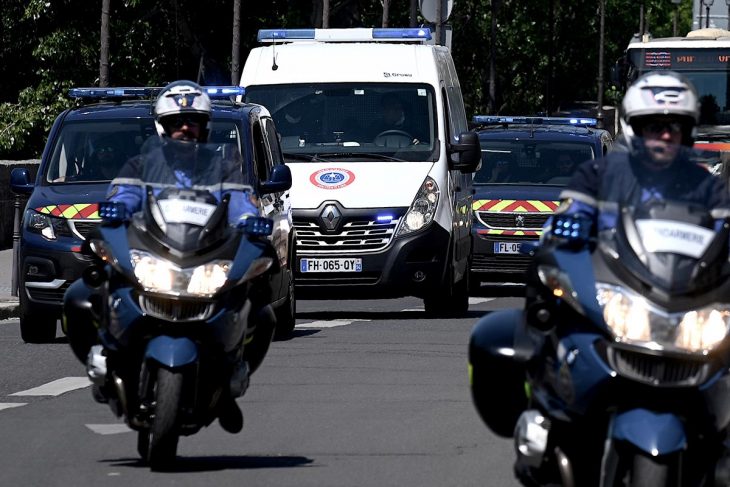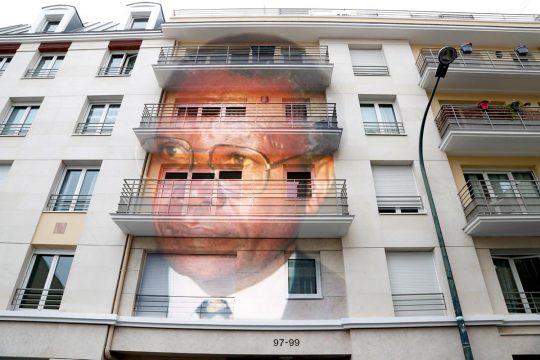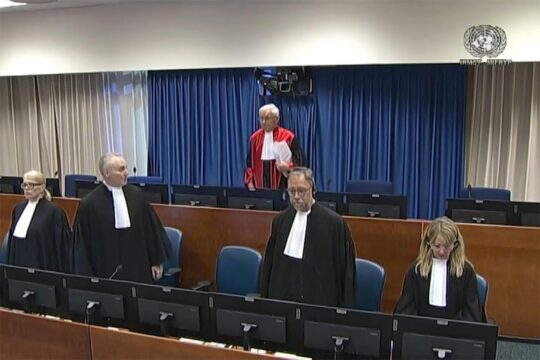Until April this year and the arrest in France of high-profile Rwandan fugitive Félicien Kabuga, 85, the International Residual Mechanism for Criminal Tribunals (IRMCT) was one of several dusty relics – elegantly named “residuals” – of the heady days when cooperation led to the establishment of internationally-backed accountability mechanisms. These residuals deal with, for example, contested trials, prisoners requesting early release, and witnesses still in need of protection.
They were seen even by those continuing to represent clients there, like lawyer Peter Robinson, as “a very moribund institution”. Every six months, its president reported to the UN Security Council about – essentially – the progress his body has made towards the ultimate goal of shutting itself down, acknowledging the UNSC’s 2010 promise of “a small, temporary and efficient structure, the functions and size of which will diminish over time”. That “temporary” structure has extended since the closure of the International Criminal Tribunal for the former Yugoslavia (ICTY) in 2017 and the International Criminal Tribunal for Rwanda (ICTR) in 2015 into 11 years on the job.
But there was light! With the successful tracking of the richest man in Rwanda in his time, long indicted by the International Criminal Tribunal for Rwanda (ICTR) for his role in the 1994 genocide, the Mechanism has taken on a new shine and the prospect of work for many years more. And the acknowledgement, yesterday September 30, by a French appeal court that the Arusha-based part of the UN body will take him to trial, confirms this positive outlook for the soon to increase by 10 % number of staff working in its Office of the Prosecutor.
Swish new courtroom in Arusha
When it closed, eight Rwandan fugitives were still left on the ICTR docket. Among them, five dossiers went to Rwandan national courts. But the Mechanism retained three. One of them, Augustin Bizimana, is now conclusively proved dead after new ways of testing his remains were used. Another, Protais Mpiranya, has the prosecutor complaining about lack of cooperation from Zimbabwe and the trade in false passports various unnamed African governments need to crack down on.
The third, former businessman Kabuga, is indeed the Mechanism’s prize. A swish new courtroom in Arusha – more than 8.7 million dollars’ worth – is intended as his destination, despite his fragile state of health. But Covid-19 fears that may put such a transfer on hold may only add to the many delays expected in this process.
Reinvestigating a cold case
For a start there will be a re-evaluation of the material the prosecution needs to prove the case against him. “First of all, the prosecution has to reinvestigate its cold case,” warns Robinson. The seven counts of genocide and crimes against humanity against Kabuga, dating back to 2003 and modified in 2011, allege Kabuga’s central role in the genocide. Via his relationships to the Interahamwe militia, the ruling party, and the media he “used his power, influence and position of authority to ensure that the crimes for which he is charged were committed”, says the indictment.
The prosecutor’s office will have to decide how “selective and strategic” the indictment will be - as criminal lawyer Yasmine Chubin who worked in the ICTR prosecutor’s office, puts it. “Given Kabuga’s age and the passage of time since the events of 1994, how large of a case will they choose to bring against him? Will the IRMCT prosecutors decide to only focus on the counts they can prove somewhat quickly, or will they attempt to capture the full extent of his criminality at the risk of a multi-year trial?”
Kabuga was one of the founders of the notorious RTLM radio. Findings from the Media trial judgment “could streamline certain aspects of the prosecution case”, says Chubin, although she warns the process “would face defence objections and be litigated”, which would “in itself be time-consuming”. It can only be “very specific types of facts” that the prosecutor would be able to re-use. Although Nicola Palmer, a senior lecturer in criminal law at King’s College, points to many ICTR trials “that have dealt with individuals who he is alleged to have been working in close contact with”, the challenge will be, she says, “trying to think about how those cases can be coherent together”.
Kabuga’s alleged role in the genocide is closely intertwined with how it was planned. For example, the importing of machetes in advance. This “weapons aspect” becomes “incredibly important” says Palmer when you consider “the wider question of how arms were moving into Rwanda… from the start of the civil war”.
Financing the genocide – what evidence?
On the financing of the genocide, evidence will be needed which was never examined in depth at the ICTR. Palmer refers to material on “the financial networks that he could have had access to”. “What are the sets of relationships outside of Rwanda that were helping to finance the genocide?” she asks. Financial analysts could “make the task a lot easier”, says Chubin. This is “a really missing part of the accounts of what happened in 1994,” says Palmer and it has implications also for how “he was able to evade justice for all of these years”. In June, IRMCT prosecutor Serge Brammertz told journalists that unexpected savings due to Covid-19 meant that, without asking for more funds, he was able to hire eight or nine new temporary staff “with the right profile”.
Defence counsel investigations may force a delay, warns Robinson. “The Rwandan authorities don't always cooperate very robustly with the defence. Defence counsel will have to start from scratch and they will be dependent on the disclosure that the prosecution gives to them,” he says. And with a very old person in this Covid-19 time, exceptionally vulnerable means “if they ever do get the trial started they won't be able to sit full weeks because of his health.”
Huge interest in Rwanda
Alphonse Muleefu teaches law at the University of Rwanda. He says Kabuga’s profile as a “big man” combined with his evasion of justice has meant “his name continues to be alive in Rwanda”. There’s a huge interest in “his money and connections around the world”, as well as who protected him, “how he managed to get those passports, how he managed to travel from one country to another, how he managed to live in France for so long” undetected when his “wanted” photo was circulating so widely.
Through domestic trials and gacaca processes “most Rwandans have now participated in some form of legal accountability for those crimes,” says Palmer, most often as perpetrators and victims testifying under gacaca. The Kabuga investigation will not just have available the material of the ICTR, but also “intersect with all of that input, with all of that prior investigation”, she says.
Chubin has been working regularly with Rwandan justice sector actors and says they, together with victim groups, are genuinely thrilled about the arrest. “It is a big achievement,” agrees Muleefu. Others in Rwanda, Chubin says, have expressed their regret that he isn’t being tried in their domestic system. “We've been doing these cases since 2012” is the sentiment she’s heard expressed, with a growing number of national jurisdictions – of which France is not a part – consistently continuing to approve extraditions to Rwanda.
For Muleefu it should be seen as prosecution “in the interests of the public”, with Rwandans deserving “priority” as “those who are directly concerned”. We want to “be able to follow the trial, to be able to have that feeling that justice is being served. So it's a simple understanding of how justice should work, and that justice is seen to be done”. But there’s no dispute, says Muleefu, that Kabuga falls primarily under the Mechanism because he was arrested on the basis of an ICTR arrest warrant. “So it has primacy,” he concludes. “But the question is: Is that the right thing to do?”








